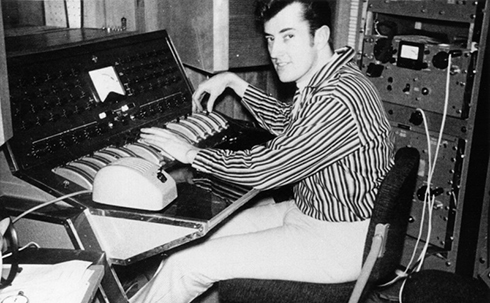From crazy custom instruments to obscure musicians, Chordify Relics is the place to discover fun facts, music myths and other top-notch trivia!
Joe Meek: one of the most influential, unknown (and insane) producers ever
Most of the recording techniques in modern pop which are now considered standard were pioneered by obscure British producer Joe Meek. Even though he wasn’t able to play an instrument or read and write notation, it didn’t stop Meek from coming up with groundbreaking techniques like dubbing instruments, adding echo and reverb, sampling and recording instruments separately. Basically, all the studio recording tricks that are now considered the norm.
 Joe Meek at Lansdowne
Joe Meek at Lansdowne
Meek had a very brief career as a producer, with a few ups and a lot more downs. In 1962, the first communications satellite was launched. It was called Telstar and looked an awful lot like the Death Star. It may or may not have inspired George Lucas, but it certainly inspired producer Joe Meek to write a disturbingly cheerful song about it. Performed by The Tornados, it became the first British number one hit single in the US Hot 100 and made Meek’s career.
The Tornados – Telstar
For a while, things were great. Meek had a recording studio at his home in London, producing artists like Tom Jones (right before he became world famous) and passing up on the chance to work with David Bowie and The Beatles. He continued to experiment with revolutionary techniques, like recording instruments separately, which is now the rule of thumb, but was unheard of during his time, and making good use of the acoustics in his bathroom and on the staircase.
His producing experiments earned him more than a couple of gold records and the title of “British Phil Spector”, which was still a compliment back then. But things took a turn for the worse when he was arrested for picking up guys (homosexuality was still illegal in the UK back then) and was subsequently blackmailed by shady underworld characters.
Play along with a Meek production: The Honeycombs – I have the Right
Shortly afterwards, Meek was sued by French composer Jean Ledrut, who claimed that “Telstar” was ripped from a score he had written for the 1960 film Austerlitz. The royalties were frozen while the case was pending. This, combined with paying off criminals puts a serious strain on any home budget, and Meek compensated for the financial deficit with drugs, a keen interest in the occult and an unhealthy dose of paranoia.
Graveyard recordings & the ghost of Buddy Holly
Meek attempted to contact the ghost of Buddy Holly during seances. He believed that Buddy told him his studio was bugged by competing studios and Phil Spector and that it was probably a good idea to do his recordings elsewhere, like, maybe a graveyard. And so Meek spent his drug fueled nights recording voices from beyond the grave, which were channeled through the stray cats who kept him company.
Joe Meeks Graveyard recordings
In January of 1967, the London police found the body of a seventeen year old boy, neatly chopped up and divided in two suitcases. Meek knew the boy and although he didn’t kill him, in a rare moment of clarity, he figured out that hanging out in graveyards whilst high and recording cats saying “Help me”, because Buddy Holly told him so, might not be the best alibi ever.
The clarity didn’t last, however and on 3 February 1967, in a fit of panic and paranoia, he shot his landlady and then himself, killing them both.
Legacy
Despite all the personal tragedy and weird escapades, Meek left quite a legacy. He worked on 245 singles, of which 45 reached the top 50 in either the US or the UK. He also had a truckload of unfinished and unreleased recordings hidden away in a tea chest. These Tea Chest Tapes contain over 4,000 hours of music on 1,850 tapes, including recordings by David Bowie, Tom Jones, Jimmy Page (Led Zeppelin), Ritchie Blackmore (Deep Purple) and Mitch Mitchell (The Jimi Hendrix Experience).